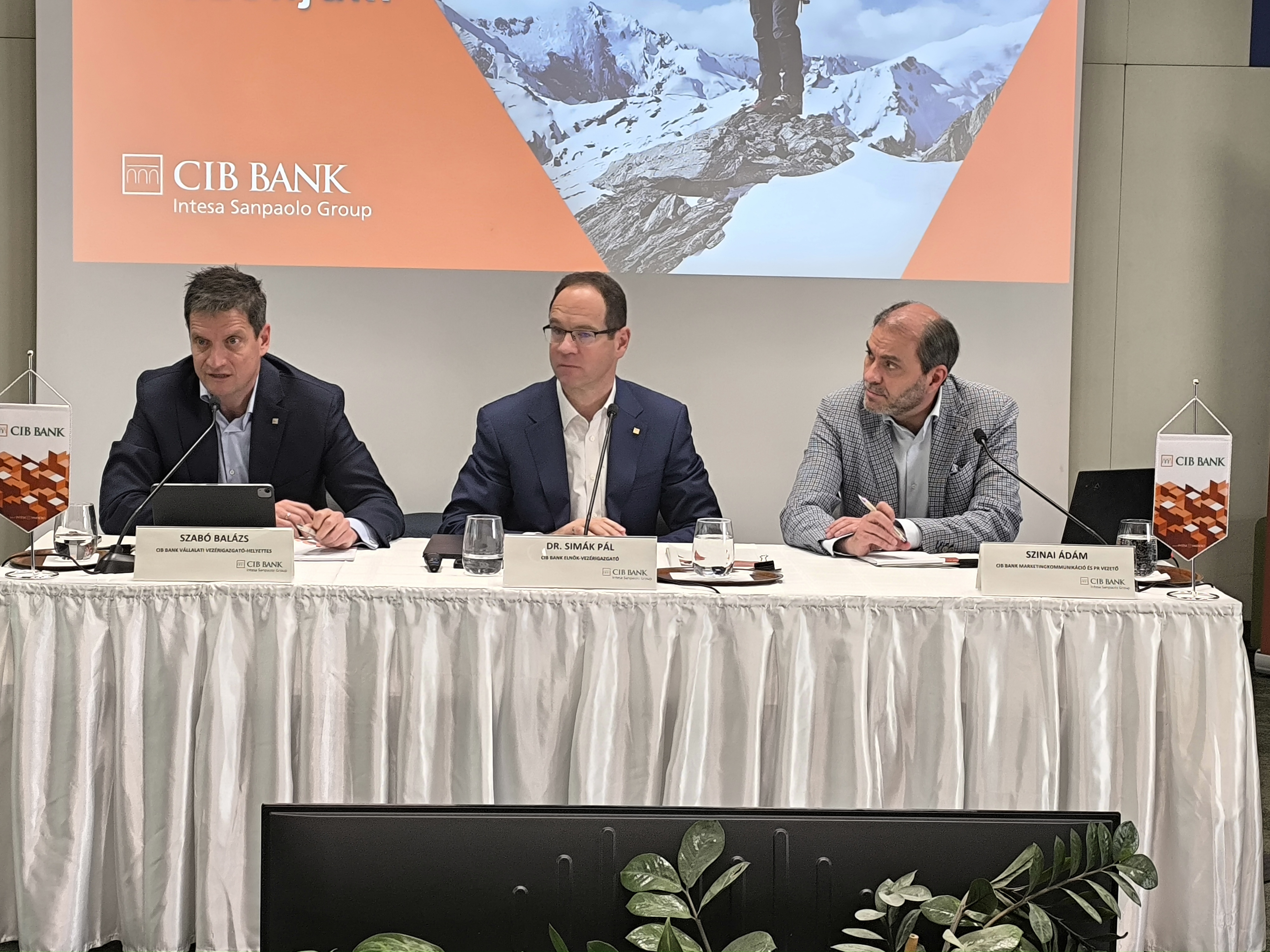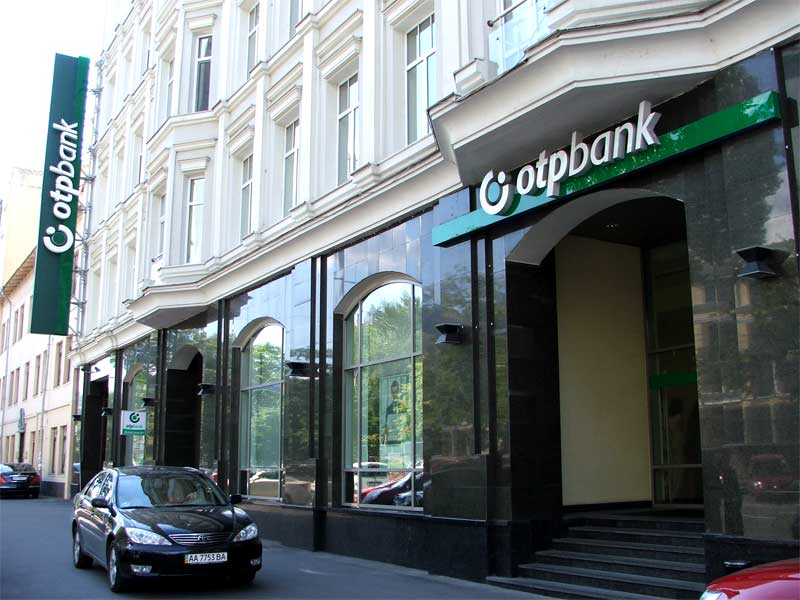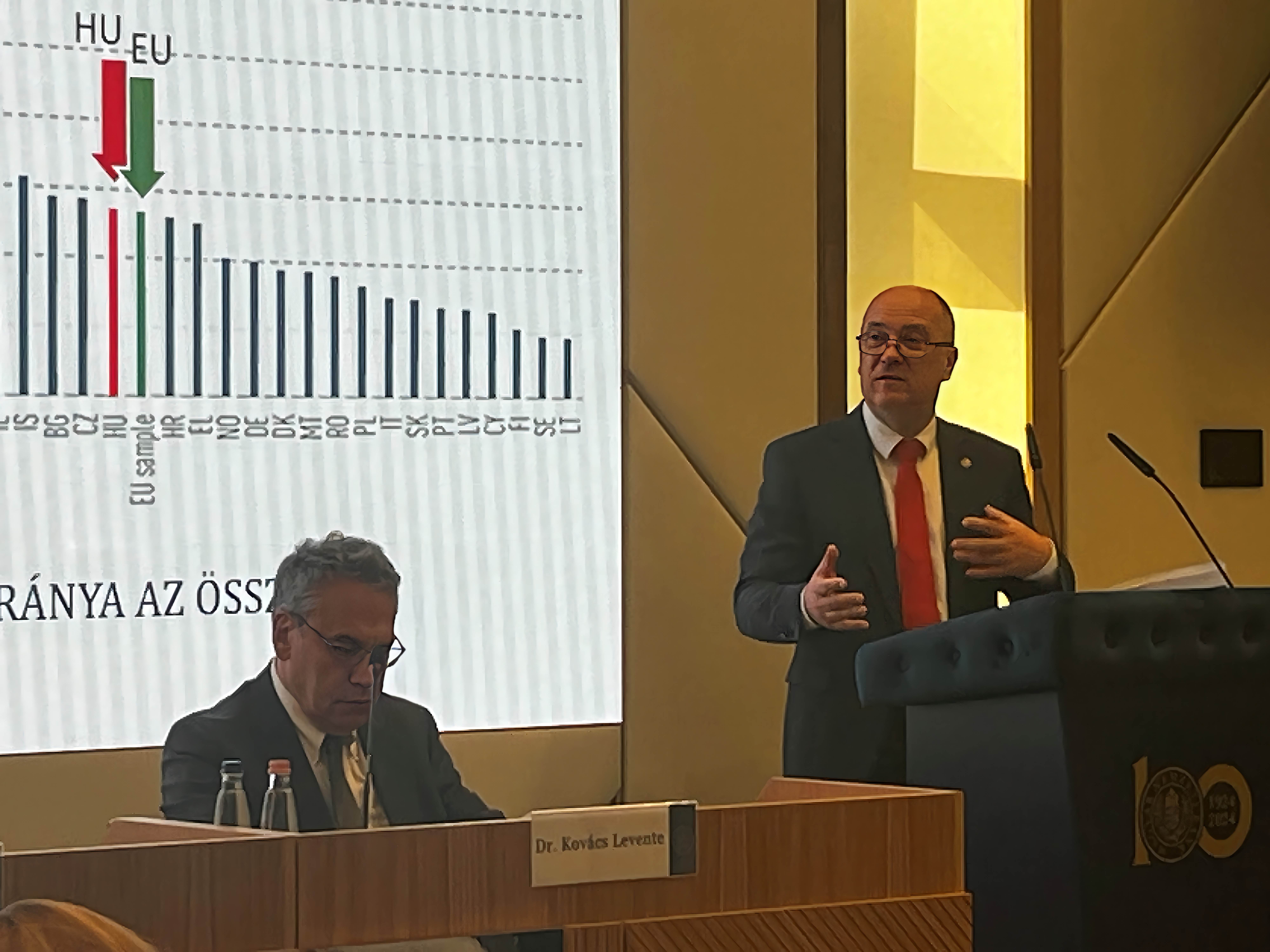CIB Group Closes 2023 with Record Performance

From left, Balázs Szabó (deputy CEO), Pál Simák (CEO), and Ádám Szinai (head of marketing and communications) of CIB Bank.
Last year was the most successful in CIB Bank’s history to date, boasting a record profit of HUF 63.9 billion alongside significant growth in its loan and deposit portfolios, far exceeding the market average. The bank announced a series of growth figures that defied negative market trends, including increasing mortgage disbursements despite a halved market.
Executives told journalists at a press briefing on March 26 that the credit portfolio of CIB Bank, part of the Italian international banking group Intesa Sanpaolo, is of a “higher quality” than the market average.
“2023 was indeed a milestone year for both the 45-year-old CIB Bank and the 25-year-old CIB Leasing,” CEO Pál Simák said. He added that ranking typically between fifth and seventh in market share as a major universal bank, 2023 witnessed the highest return on equity among its peers due to substantial portfolio growth.
“Revenues increased by 25% last year, while costs rose by only 12%, resulting in a 77% surge in taxed profits to HUF 63.9 bln, translating to a 21.5% return on equity. This performance minimally felt the impact of one-off items, such as the fair value of baby-waiting loans contributing an additional HUF 2 bln-3 bln,” Simák added.
The business volumes significantly outperformed the sector average: the loan portfolio grew 9% to HUF 1.598 trillion and deposits by 12.3% to HUF 2.396 tln.
“The quality of our credit portfolio ranks among the best in the market, with non-performing loans dropping to 1.9% and loans overdue by more than 90 days stagnating at 0.6%,” Simák emphasized.
In response to a question, Simák stated, “Our focus remains on organic growth without compromising the quality of our credit portfolio, given the limited opportunities for acquisitions.”
Despite a moderate decrease in corporate customers, the retail customer base expanded by 4%, and the bank achieved growth in disbursements for retail loans, personal loans, and baby waiting loans, with corporate loans growing by 4.8%. Excluding personal loans, these figures surpassed those of the previous year. Deposit growth was driven by corporate customers, with a notable increase, while retail deposits saw a decrease in market share.
Digital Penetration
“The bank’s digital customer ratio stands at 84.1%, one of the highest penetration rates in Hungary,” Simák further detailed.
“The current strategic cycle (2022-2025) focuses on five pillars: extensive digitalization; dynamic growth in lending and fee-generating services with a strong ESG focus; enhancing employee motivation and engagement; strengthening the credit process while maintaining loan quality; and modernizing and stabilizing the IT architecture,” Simák elaborated.
He also emphasized the growing importance of ESG considerations in governance and lending, attributing many of the bank’s accolades to employee satisfaction.
Regarding market trends, the CEO anticipates an increase in consumer lending and intensive SME lending, declining but still high inflation, especially in the first half, accelerating ESG trends, continued and robust digitalization across the market, cyber fraud prevention, and the increasing use of artificial intelligence.
The bank’s analysts expect 2.5% GDP growth for 2024 after a 0.9% decline last year, with the average Budapest Interbank Offered Rate (Bubor) rate dropping from 14% to 6.7% this year and to 5.3% next year, which should support lending. The average exchange rate is projected to be around HUF 386 compared to last year’s HUF 381.
“We reported a 20% year-on-year increase in the number of corporate and SME customers, with significant growth in the corporate and leasing division and a stable position in leasing and fleet financing,” deputy CEO Balázs Szabó reported. New ESG financing amounted to HUF 18.7 bln, with a slight increase in new disbursements and portfolio growth in leasing.
“The division contributed over 20% to the revenues of the Intesa Sanpaolo subsidiary division,” Szabó added.
Despite limited investment appetite and a projected slight increase in overall market lending volume, financing supply chains will become increasingly important regionally and globally.
Moderate Expectations
“Expectations for the leasing side are moderate, with a transformation in the passenger car market and a particularly pessimistic outlook for agricultural machinery, indicating stagnant disbursements for the year,” Szabó noted.
The deputy CEO also mentioned that some companies are taking advantage of market loans available at Bubor-equivalent interest rates as part of a short-term government and banking agreement. Still, the period is too brief to fundamentally alter corporate lending market trends.
“Our 12% market share in mortgage lending is attributed to an increase in new disbursements against the market trend,” Simák explained.
The digital channel accounts for 75% of personal loans and 36% of account openings, with a 12% ratio for mortgage applications. Numerous customer satisfaction initiatives are in place, with particular attention to the age group under 24, constituting 12% of the portfolio.
Approximately HUF 200 bln was shifted from deposits to higher-yield securities in retail savings, representing a quarter of the retail deposit portfolio, resulting in a 9% increase in total retail wealth.
The small business loan portfolio grew by nearly 10% last year, with savings increasing by 9%. The bank was the fourth-largest player in the Széchenyi Card Program, achieving significant market shares in overdraft and liquidity loans. Acquisition of customers with annual revenues of between HUF 300 million and HUF 1 bln resulted in a 13.5% market share, ranking third in the market.
CIB Bank anticipates growth in retail lending with a strong focus on ESG and digitalization, potentially aiding the small business sector’s recovery from the recession. A dynamic increase in customer numbers is planned.
Asked about the latest round of the Csok housing subsidy that offers a maximum interest rate of 3% on mortgages of up to HUF 50 mln for families with three children, Simák said, “The volume of the newly available Csok Plusz was slightly higher than expected, although the number of deals was slightly lower.”
A new development launched in February allows for personal loans up to HUF 15 million, the highest available amount in the market, based on a complex scoring and risk-based pricing system.
“Experience suggests a higher likelihood of repayment for larger loans. Energy renovations have a positive impact on this market,” the CEO concluded.
This article was first published in the Budapest Business Journal print issue of April 8, 2024.
SUPPORT THE BUDAPEST BUSINESS JOURNAL
Producing journalism that is worthy of the name is a costly business. For 27 years, the publishers, editors and reporters of the Budapest Business Journal have striven to bring you business news that works, information that you can trust, that is factual, accurate and presented without fear or favor.
Newspaper organizations across the globe have struggled to find a business model that allows them to continue to excel, without compromising their ability to perform. Most recently, some have experimented with the idea of involving their most important stakeholders, their readers.
We would like to offer that same opportunity to our readers. We would like to invite you to help us deliver the quality business journalism you require. Hit our Support the BBJ button and you can choose the how much and how often you send us your contributions.












